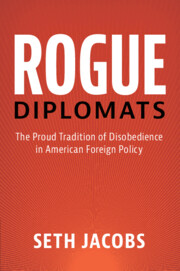Book contents
- Rogue Diplomats
- Cambridge Studies in US Foreign Relations
- Rogue Diplomats
- Copyright page
- Dedication
- Contents
- Acknowledgments
- Introduction
- 1 “It Is Glory to Have Broken Such Infamous Orders”
- 2 “Service without Authority”
- 3 “Instructions or No Instructions”
- 4 “I Have Now Read the Dispatch, But I Do Not Agree with It”
- 5 “No ‘Rubber Stamp’ Ambassador”
- 6 “We Can’t Fire Him”
- Conclusion
- Bibliography
- Index
4 - “I Have Now Read the Dispatch, But I Do Not Agree with It”
Page Preserves America’s “Special Relationship”
Published online by Cambridge University Press: 24 April 2020
- Rogue Diplomats
- Cambridge Studies in US Foreign Relations
- Rogue Diplomats
- Copyright page
- Dedication
- Contents
- Acknowledgments
- Introduction
- 1 “It Is Glory to Have Broken Such Infamous Orders”
- 2 “Service without Authority”
- 3 “Instructions or No Instructions”
- 4 “I Have Now Read the Dispatch, But I Do Not Agree with It”
- 5 “No ‘Rubber Stamp’ Ambassador”
- 6 “We Can’t Fire Him”
- Conclusion
- Bibliography
- Index
Summary
Chapter 4 chronicles how Walter Hines Page, a diplomatic novice when President Woodrow Wilson tapped him to head Embassy London, proved one of the pivotal actors in World War I. While Wilson - and most of his cabinet - strove to maintain American neutrality in this conflict, Page, virtually from the moment hostilities erupted, strained every nerve and sinew to bring Washington into the war on the side of the Allies, especially Britain. The White House and State Department were unresponsive to Page's entreaties for many months - indeed, he was frequently threatened with cashiering - but his relentless cannonade of cables, letters, and other forms of trans-Atlantic arm-twisting bore fruit when Wilson accepted the logic of the ambassador's main argument: that German domination of the Continent would pose an unacceptable menace to the Western Hemisphere. Wilson's famous proclamation to Congress that "the world must be made safe for democracy" was a virtual paraphrase of Page's correspondence. Many interwar American historians, among them Harry Elmer Barnes and C. Harley Grattan, considered U.S. entry into the so-called "Great War" a calamity and blamed Page for nudging America off the tightrope of neautrality. I argue that this charge - oft-belittled in the post-World War II period - was in fact largely correct, but that Page's insubordination was heroic rather than nefarious.
Keywords
- Type
- Chapter
- Information
- Rogue DiplomatsThe Proud Tradition of Disobedience in American Foreign Policy, pp. 197 - 238Publisher: Cambridge University PressPrint publication year: 2020



